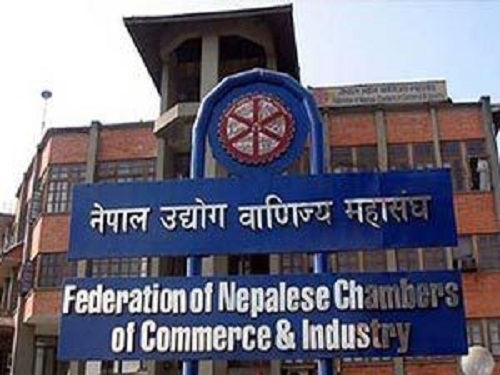

“We invest, please make the process easier. We produce, please don’t obstruct us. We provide employment, please do not protest. We export items, please support us. We bring tourists, please welcome them. We pay revenues, please do not insult us,” said Shekhar Golchha, president of the Federation of Nepalese Chambers of Commerce and Industry (FNCCI).
The 56th Annual General Assembly and Industry and Commerce Day of the Federation held in Kathmandu today. The economy, which was in crisis due to COVID-19, is gradually returning to normalcy. Although the government has gradually created an environment for investment, the expected results have not been achieved.
The private sector is one of the three pillars of the economy. However, the country has not been able to increase the expected amount of investment. Amid complaints that an investment-friendly environment has not been created, Golchha cited a short- and a long-term crisis, which he said was due to opacity and short-term policy confusion.
Chairman Golchha says that the industrialists and the businessmen here have closely followed the situation in Sri Lanka and hope to prevent the same from happening in Nepal.
“We are not like Sri Lanka, but if we are not careful now, we will be in a very bad situation in a few years,” he said.
President Golchha stressed on the need to strengthen the money transfer mechanism and create investment opportunities in the country to prevent the crisis. “Production demands employment. If this can be facilitated, the market will grow. When the demand in the world market increases, more opportunities are created. The wealth of the country increases. If wealth increases, all aspects, including social justice, will be strengthened.”
Stating that it is sad that the private sector, which has 77 percent share in the economy and 75 percent more jobs, is not aware of the discussions and decisions made by the Finance Ministry and the Nepal Rastra Bank, he stressed on the need to find a solution by discussing the problems in the economy. He said, “We are also citizens of this country, our investment in the economy adds up to 77 percent. We have created about 75 percent employment here. At the same rate, revenue is collected through us. We also want to contribute to the crisis, we also love the country. ”
Stating that there is no need to panic based on the details of the seven months of the current fiscal year, he said that the country has been facing crisis since last October. President Golchha complained that the private sector was considered as a source of revenue but not a partner in development.
This emotional address by Golchha, the president of the federation, an umbrella organization of industrialists, may have touched the guest chief secretary Shankar Das Bairagi as well. Therefore, the complaints of Chairman Golchha were also expressed in his address. He denied the allegations in his statement,”Baseless allegations concerning the private sector have been made more than once.
“The private sector is the exclusive development partner of the government. We have partnered in every field. The government and the private sector have no choice but to join hands.” He said that the situation in the country was not bad and that there were no problems as rumored. “There are some risk factors. We must all work together to find a solution. We need to discuss with an open heart and come up with solutions.”
“The objectives are similar between the government and the private sector. Improvement is a continuous process. We are ready to rectify any shortcomings,” he said, encouraging the private sector. “The government is doing its part to create a conducive environment for investment.”
FNCCI Senior Vice President Chandra Prasad Dhakal also spoke on the problems seen in the economy and solutions, coordination between the government and the private sector. He cited the previous example of Sri Lanka, saying, “There are problems, but they are not insurmountable. We must all be vigilant for that.” He emphasized that there was no need to delay in identifying the problem and resolving it.